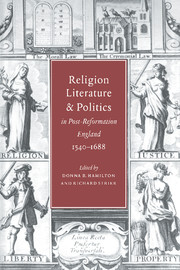Book contents
- Frontmatter
- Contents
- List of contributors
- Introduction
- 1 Sir John Oldcastle as symbol of Reformation historiography
- 2 The “sacred hunger of ambitious minds”: Spenser's savage religion
- 3 Subversive fathers and suffering subjects: Shakespeare and Christianity
- 4 Kneeling and the body politic
- 5 Donne and the politics of devotion
- 6 Catholic, Anglican or puritan? Edward Sackville, fourth Earl of Dorset, and the ambiguities of religion in early Stuart England
- 7 Crucifixion or apocalypse? Refiguring the Eikon Basilike
- 8 Marvell, sacrilege, and Protestant historiography: contextualizing “Upon Appleton House”
- 9 Entering The Temple: women, reading, and devotion in seventeenth-century England
- 10 Contextualizing Dryden's Absalom: William Lawrence, the laws of marriage, and the case for King Monmouth
- 11 Reformation in the Restoration Crisis, 1679–1682
- 12 Shadwell's dramatic trimming
- Index
2 - The “sacred hunger of ambitious minds”: Spenser's savage religion
Published online by Cambridge University Press: 16 October 2009
- Frontmatter
- Contents
- List of contributors
- Introduction
- 1 Sir John Oldcastle as symbol of Reformation historiography
- 2 The “sacred hunger of ambitious minds”: Spenser's savage religion
- 3 Subversive fathers and suffering subjects: Shakespeare and Christianity
- 4 Kneeling and the body politic
- 5 Donne and the politics of devotion
- 6 Catholic, Anglican or puritan? Edward Sackville, fourth Earl of Dorset, and the ambiguities of religion in early Stuart England
- 7 Crucifixion or apocalypse? Refiguring the Eikon Basilike
- 8 Marvell, sacrilege, and Protestant historiography: contextualizing “Upon Appleton House”
- 9 Entering The Temple: women, reading, and devotion in seventeenth-century England
- 10 Contextualizing Dryden's Absalom: William Lawrence, the laws of marriage, and the case for King Monmouth
- 11 Reformation in the Restoration Crisis, 1679–1682
- 12 Shadwell's dramatic trimming
- Index
Summary
Discussions of Spenser's religious affiliation usually try to determine the precise nature of his faith from a scrupulous reading of his poetry. Critics have generally sifted through the evidence for doctrinal clues and lined these up against other contemporary writings to decide which label fitted Spenser best: Calvinist, Puritan, Anglican or Protestant. But Spenser's religious views cannot be studied in isolation from other beliefs he might have held, or discourses he might have used, because, for Spenser, an English exile in Ireland from (at least) 1580 until his death, there could be no easy separation of religious views and political position. In Ireland in the last decades of the sixteenth-century considerations of personal religious persuasion had to be perceived in the light of other forces determining cultural and national identity; Spenser was forced to define himself as an English Protestant in order to distinguish himself from the Irish papists.
Generally critics of the Faerie Queene have tried to circumscribe the influence of Spenser's Irish experience to the last three books, choosing to overlook the stubborn fact that the first edition of the poem did not appear in print until 1590, by which time Spenser had been resident in Ireland for ten years. Book 1, for example, has usually been straightforwardly decoded by commentators from the early seventeenth century to the present day without reference to Ireland.
- Type
- Chapter
- Information
- Publisher: Cambridge University PressPrint publication year: 1996
- 5
- Cited by



